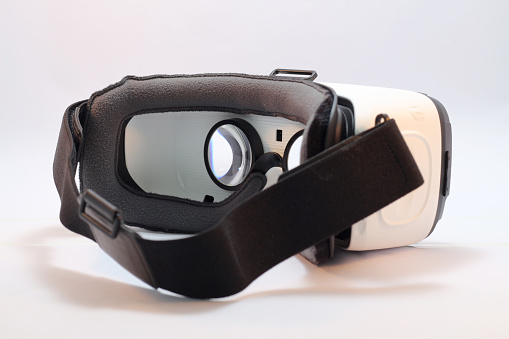Canada’s software engineers are known worldwide for their creativity and ability to innovate. Vancouver, in particular, is becoming known as a hub producing and attracting digital media, animation, and video gaming. One of the dynamic startups operating at the cutting edge of this industry is Archiact, a Vancouver-based virtual reality (VR) content design and content publishing company. Over the past four years of its operation, the company has experienced significant success and now employs 80 people internationally. Derek Chen, co-founder and president of Archiact, highlights that North America is the “engine that drives VR forward,” with European and other markets focusing on augmented reality.
Derek describes the unique environment in Vancouver that has allowed his company to grow and thrive. “I’m a bit lucky because Vancouver has the three pillars: rendering talent; creative talent – the guys who write scripts, construct virtual worlds; and then we have the engineering guys who do programming. We have Apple, IBM, SAP, [and] we have Amazon, Microsoft – they’re all here. We’re considered the backyard of Hollywood, so we have so many creative guys here. And also, the gaming industry – the backbone of the gaming industry in North America was here 20 years ago. We kind of resigned from that, but we are trying to gain it back. – the guys who can do really cool 3D stuff. Animation, creative stories, and creative direction – these are the three core pillars for VR. If you’re missing any one of these, you cannot do it. It’s why Silicon Valley cannot do hardware. L.A. cannot do engineering. Silicon Valley doesn’t have content guys. None of the movies or games are done in Silicon Valley.”
 In the early days of its operation, Archiact landed on the radar of Google. Google contacted Archiact to work with Google on a full-length VR game. At the time, there were a lot of VR demos, but little full-length game content on the market. Discussing the project, Derek explains, “Back then, literally nobody knew about VR. It was the first complete mobile VR game in the world, actually. We didn’t know what was going to come out of that.”
In the early days of its operation, Archiact landed on the radar of Google. Google contacted Archiact to work with Google on a full-length VR game. At the time, there were a lot of VR demos, but little full-length game content on the market. Discussing the project, Derek explains, “Back then, literally nobody knew about VR. It was the first complete mobile VR game in the world, actually. We didn’t know what was going to come out of that.”
After Archiact’s early success, however, it ran into a plateau that mirrored the experiences of other content developers. Derek notes, “There was one problem: no one was making money. No one’s making money from the content. We got downloads, which was good, but you cannot burn investors’ money all the time, you have to find out a way to commercialize and start generating revenue from your content. I started to step back and look at the global market for VR. For North America and Europe, it’s very straightforward. The big guys are first: Samsung, Google, Sony, and so on. They were there first to basically clean the strategy board. The small guys – the startups – didn’t even have a chance to make VR headsets on the hardware side. Content is what I could do with my skill set. I’ve been a software developer for a long time. If you want to work on platform, either you have a huge user base or you have a device. So we created content, but what do you do with content? [Virtual reality systems] Oculus, Vive, and PlayStation VR were only available to consumers in the last few years. Two years ago, three years ago – nobody. No consumers.”
It was in this context that Derek began to consider an Asia strategy. In particular, he decided to explore the China market. He talked to investors and to the media and quickly realized that no one knew about VR in China. As a consequence, he realized that as a first step, he would have to educate the market. He did this through a few different vehicles. He began by leveraging diaspora networks. In his words, “First of all, Vancouver has a huge population of Chinese. That’s one way. For example, there’s the business cafes – people doing investor talks, presentations, whatever. It’s through that where we normally meet dozens of people interested in this sector. They say, “Oh, I know this guy who’s doing this in China.”
At the same time, Derek also connected with government officials at the federal and local levels who had programs to help startup companies. As he explained, “Back then, we started talking to IRAP [Industrial Research Assistance Program] guys. We also talked to Vancouver Economic Commission [VEC]. IRAP (the Industrial Research Assistance Program) and SRED (Scientific Research and Experimental Development Tax Incentive) and VEC were very helpful; they’ve been alongside us the whole time... We didn’t know what to do at the beginning; we could only make connections.”
 Derek also started going to trade shows where he began to meet Chinese companies that were working in the digital space. He continues, “Chinese companies were presenting at CES [Consumer Electronics Show]. We started building connections with them. We used two or three companies as a springboard to finding more and more. At the time, there was nothing happening in China, so it was very hard for us as well. But, as VR was progressing – and it was only in the first two to three months after we made the first contact and knew it was dead cold in China – something started to pick up. In 2005, January, nobody was doing VR. One or two articles on VR. No views, no clicks, no likes, no comments. Two months after that, we saw that there are 70 companies doing VR hardware. In the months after that, it was like 200 companies doing that. It just started to grow exponentially. But, there were no big guys that jumped in and said, ‘Hey, I’m doing this, nobody else can do this.’”
Derek also started going to trade shows where he began to meet Chinese companies that were working in the digital space. He continues, “Chinese companies were presenting at CES [Consumer Electronics Show]. We started building connections with them. We used two or three companies as a springboard to finding more and more. At the time, there was nothing happening in China, so it was very hard for us as well. But, as VR was progressing – and it was only in the first two to three months after we made the first contact and knew it was dead cold in China – something started to pick up. In 2005, January, nobody was doing VR. One or two articles on VR. No views, no clicks, no likes, no comments. Two months after that, we saw that there are 70 companies doing VR hardware. In the months after that, it was like 200 companies doing that. It just started to grow exponentially. But, there were no big guys that jumped in and said, ‘Hey, I’m doing this, nobody else can do this.’”
Notwithstanding the explosion of hardware providers, Derek realized that there was still something missing that opened up a huge business opportunity for his company: content. However, figuring out how to make money from content provision was no easy task given the prior development of the game market. Derek explains, “In China, the game market is very interesting. First of all, no one is really making money from the content side in China for consoles. PlayStation 4 – there’s about 500,000 installed units in China, but there’s close to six million globally. A lot of the units in China, they’re just sold. They’re pirated. The console is loaded with games, so no one is really making money. On the mobile side as well, there are too many content developers. The publishers, the channel providers are the ones that have the dominancy. It’s not the content guys. They’re not used to the fact that content guys, when we come in, we say that we want licence fees; they say, ‘No, we’ll get your content, we’ll put it there, that’s it.’”
When Derek initially contacted the hardware producers, informing them that he had content for licence, they ignored him, assuming that they could employ the same strategies in the VR space that they had been using in the gaming industry. However, the lack of quality VR content tipped the market in Derek’s favour, giving him some bargaining power. He explains, “After a month or two, they couldn’t get any content at all. They could pirate something from somewhere, but it was really done poorly. They eventually came back, and said ‘Okay, we’ll give you licence fees.’ Our business just started from there.” Archiact began to generate significant revenue from licensing content. As of the end of last year, Archiact signed over 40 content uses and 45 titles, and generated close to $2M in revenue.
Notwithstanding Archiact’s success, navigating the technology spheres in Canada and China has not been a walk in the park. Two elements have been key to helping Derek grow his business: employing bilingual staff and setting up a presence in China. Derek underlines, “Language is always a barrier. A lot of companies in China, especially the startup ones, you can find people who speak some English, but we talk to them about technical and really detailed stuff, and they just shy away. As a consequence, it is very important to have employees that are bilingual.” In Vancouver, Derek notes, he has benefited from the fact that there are producers and project managers who can speak Chinese very fluently. Last year, Derek opened up an office in Shanghai. He says this has helped him a lot as it allows him to gather real-time information about the market and build up trust with local partners.
 In regard to expanding outside of China, Derek says the following: “Every country is different. I was in Japan for the Tokyo Game Show with my guys, and we were together with a few other gaming companies and technology companies. The Japanese were very friendly in helping us have that booth. The Tokyo Game Show is huge – one of the biggest in the world. We’re in the pavilion showing Canadian technologies to local developers. VR wasn’t as big in Japan back then. Every country has their own rules that you need to find out and then play along with. For example, one of the things I found out is that Japan has a really mature environment for the game industry. If you want to have a game with an in-app currency, with a virtual currency, which means players can buy stuff virtually in the game, the government will enforce game developers and publishers to create a trust fund in the bank to back whatever currency they create in the game virtually. If any day the game goes under, or [is] folded or stopped, all the leftover money in the commercial currency needs to be returned back to the user from the bank. They are very mature in this space; there are a lot of government policies in place. Entertainment is one of their biggest GDP contributors. That’s why they have so many regulations. They protect companies, and also protect the players – protecting the whole ecosystem. They have a lot of other things that help the industry to grow. For example, when we publish our VR games globally, we have to contact a publisher in Japan to publish our game. It creates business for themselves. Japan is one of the most well-protected and very mature space[s] that we run into.”
In regard to expanding outside of China, Derek says the following: “Every country is different. I was in Japan for the Tokyo Game Show with my guys, and we were together with a few other gaming companies and technology companies. The Japanese were very friendly in helping us have that booth. The Tokyo Game Show is huge – one of the biggest in the world. We’re in the pavilion showing Canadian technologies to local developers. VR wasn’t as big in Japan back then. Every country has their own rules that you need to find out and then play along with. For example, one of the things I found out is that Japan has a really mature environment for the game industry. If you want to have a game with an in-app currency, with a virtual currency, which means players can buy stuff virtually in the game, the government will enforce game developers and publishers to create a trust fund in the bank to back whatever currency they create in the game virtually. If any day the game goes under, or [is] folded or stopped, all the leftover money in the commercial currency needs to be returned back to the user from the bank. They are very mature in this space; there are a lot of government policies in place. Entertainment is one of their biggest GDP contributors. That’s why they have so many regulations. They protect companies, and also protect the players – protecting the whole ecosystem. They have a lot of other things that help the industry to grow. For example, when we publish our VR games globally, we have to contact a publisher in Japan to publish our game. It creates business for themselves. Japan is one of the most well-protected and very mature space[s] that we run into.”
When asked about further areas where the Canadian government could support companies like his, Derek hones in on two issues: speeding up immigration processes for tech talent, and adopting measures to encourage investment. With respect to the former, he has brought in eight hires from Brazil and Europe, and in each case there have been significant delays. These delays can cause a project to be scuttled. For startups, he explains, especially tech companies, “If you’re hiring someone, you usually are in great need. You can’t wait for a few months.”
Addressing the investment environment is more complicated, although Derek thinks there may be opportunities to access more investment from China. He states, “I know for sure in China the investment atmosphere is much more active. To be honest, we talked to many local investors since the beginning of the company, but all of them need you to prove that you don’t need money, and then they can give you money. So, they want to see numbers, revenue, whatever. They come from traditional industries: energy, resources. They are accustomed to low-risk investment. That’s not high-tech. It works very differently.” However, Derek thinks this mentality may be changing.
Derek is hopeful that a recently proposed tax bracket for VR, mixed reality, and augmented reality tech companies, coupled with possible federal investments in a supercluster for VR/mixed reality and immersion technology, will energize both development and investment in the sector. He is also exploring establishing an angel fund to focus on the VR industry in B.C., and he believes that it would attract hundreds of investors from China. In his view, there are many investors who would like to invest in Vancouver but don’t know how. Such a vehicle would provide them with an easy way to do so.
The future looks rosy for Archiact as it moves beyond the gaming space to explore how VR can be used to support fashion retailing, the architecture industry, and health care.




